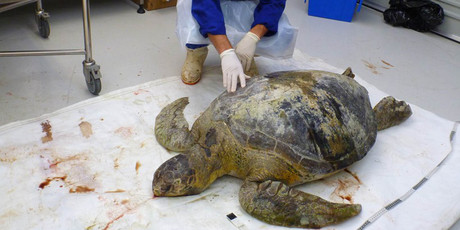Quote:
Our plastic rubbish killing sea life
by Sophie Barclay5:30 AM Monday Mar 4, 2013
To mark Seaweek, Element magazine's Sophie Barclay meets those dedicated to cleaning up the oceans

Dan Godoy with a turtle harmed by eating plastics.
Marine turtles can't
differentiate between natural prey and plastic. Photo / NZ Herald
Dan Godoy hands me a plastic jar. It's filled with rubbish fragments: fishing line, rope, plastic bag pieces, remnants of plastic packaging, the end of an old balloon and blue, jagged hunks of a bucket, about the size of a 20c piece.
The 224 pieces of plastic were found in the stomach of one turtle.
Plastics sit in a solid knot in the stomach, causing digestive problems. When turtles feed on normal foods, these begin to ferment, creating a buildup of gas. These turtles are called "floaters" and bob helplessly on the surface. They cannot feed and their metabolism drops.
"I've seen photos of turtles that have remained at the surface for so long that they get sunburned and their shell starts to peel while it's alive," says Mr Godoy, a PhD candidate from Massey University who is researching the biology of turtles.
At least 44 per cent of marine bird species are known to eat plastic. Last year a sperm whale calf found dead in the Aegean Sea contained all kinds of rubbish, including 100 plastic bags.
A floating plastic bag and a jellyfish look nearly identical, as do fish eggs and the tiny plastic resin pellets - nurdles - used to make plastic.
Mr Godoy says most plastics eaten by turtles are clear and white. "Marine turtles can't differentiate between natural prey and plastic."
Plastics are riddled with chemicals to create useful qualities such as flexibility or transparency.
Dianna Cohen, from the US-based Plastic Pollution Coalition, is supporting Waiheke Island's BYO Bag initiative, which aims to make the island plastic bag free. She says some of these chemicals, including bisphenol A (BPA) and hormone-disrupting chemicals called phthalates, have been linked to cancer, diabetes, obesity, Alzheimer's, autism, and a number of sexual problems like lower sexual functioning, sterility and infertility in humans.
BPA is allowed in New Zealand, and plastics containing BPA line our canned food. Its use has been banned in some products in countries including the European Union states, China, Malaysia and America.
Wind and ocean currents direct rubbish that has been dumped, dropped, buried or blown out of landfills into 11 patches in the ocean, over a period of about five years.
Of these, the best known is the "great Pacific rubbish patch" in the northwest Pacific which stretches about 700,000sq km.
Midway Atoll is also in the northwest Pacific, just over 2000km from Honolulu and 4000km from Japan. Evidence of humanity's "civilisation" litters the shore: toothbrushes, mugs, lightbulbs and lighters in an array of colours. And 8.6 tonnes of nets are washed up each year, often containing seals and turtles.
The water surrounding the island is littered with plastic detritus eaten by fish and mammals and regurgitated by birds to their chicks. Nearly all albatross chicks are fed plastic. Researchers found 17 bottle caps inside one adult bird's carcass.
New research from Dr Hideshige Takada, a Japanese scientist at the Tokyo University of Agriculture and Technology, shows that pieces of plastic suck in toxins in the seawater.
Dr Takada is researching persistent organic pollutants (POPs) - chemicals which include harmful pesticides such as DDT, and textile flame-retardants. POPs break down slowly. They can dissolve in oil, fat and plastic (a "solid oil").
"Concentrations in marine plastic fragments are millions of times higher than those in seawater," he says.
Dr Takada's study shows that microplastics are absorbing chemicals from the surrounding seawater and being transferred to the stomach tissues of plastic-eating seabirds.
POPs can harm DNA, affect the thyroid system and the brain, disrupt hormones and weaken the immune system. In 1998, mass deaths of seals in the North Sea were put down to high POP levels in the ocean.
Ms Cohen says there's more to stemming the tide than just cleaning up our beaches. The Plastic Pollution Coalition emphasises the four Rs - reduce, reuse and recycle and refuse.
About 225 million tonnes of plastic are produced globally each year. New Zealand imported nearly 210,00 tonnes of nurdles last year and 61 per cent of plastics made in New Zealand are used for packaging.
Single-use, disposable plastic accounts for 72 per cent of rubbish picked up on New Zealand beaches, according to research from Sustainable Coastlines.
Spokesman Camden Howitt says the public has the ultimate power to stop the plastic problem.
"Although nurdles on the beach seem like a manufacturing problem, it's really caused by demand for plastic-packaged products," he says. "Individuals can influence this simply by choosing to buy fewer products wrapped in plastic."
Essentially, says Mr Godoy, we need to realise that our actions have consequences.
"We always treat the ocean and the environment as though they are separate from us, but it's an integral part of us. It's our responsibility to acknowledge and understand what kind of impacts we have on a day-to-day basis."
Alternatives to plastic
Food storage
Glass, stainless steel, wood and ceramic containers.
Drink bottles
Plastic drink bottles last 500 years.
Steel or glass drink bottles cost about $20.
Bring your own bags
More than 40,000 plastic shopping bags are dumped in landfills every hour in NZ.
Cotton or hemp bags can be used thousands of times.
Alternatives to plastic
Plant-based "plastics" are made by manufacturer FriendlyPak and contain no toxic or dangerous ingredients.
Got a solution?
Submit your business ideas for solutions to single-use disposal plastic by March 10. Win $50,000.
Learn more
Dianna Cohen from the US-based Plastic Pollution Coalition will speak on possible solutions, Silo Park, tomorrow at 11.30am. Sustainablecoastlines.org has more information.
On the web
http://plasticfreeguide.com/

No comments:
Post a Comment